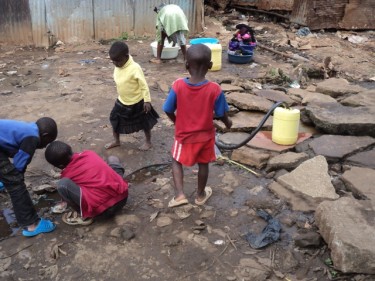This post is part of a series of reports from Global Voices’ collaboration with Map Kibera and Map Mathare [1] that took place during the Global Voices Summit [2] in Nairobi in July 2012.
By Liana Aghajanian [3] and Christian Bwaya [4]
Residents in Kenya's slums are used to hearing things go ‘bump’ in the night. Lacking proper sewage and sanitation, many resort to using the aptly-named flying toilet method, using plastic or paper bags for defecation and then tossing them as far as possible. Many bags end up on the people's roofs with a big thud.
But in Mathare, Kenya's second largest slum with an estimated 500,000 people, flying toilets, along with “hanging” latrines that empty fecal matter directly into the Mathare River that flows through the area, bring more complications and dangers than just noise.
With existing sewage lines blocked, the river, surrounded by an overwhelming amount of refuse, is a site for dumping waste and a breeding ground for diseases like typhoid, hepatitis, cholera and polio. Diarrhea caused by improper sanitation is also leading cause of death in children in slums like Mathare.
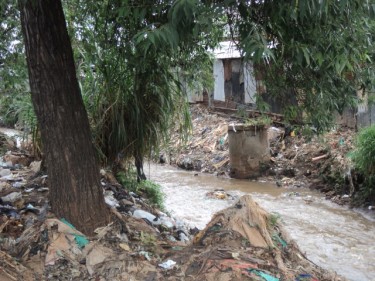
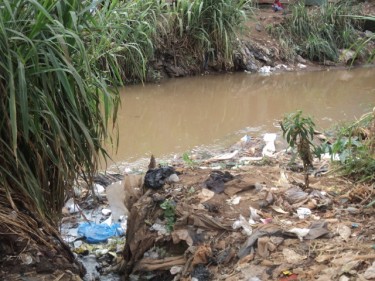
In alignment with Millenium Development Goals adopted by almost 200 nations, the Kenyan government has promised to halve the number of people without access to safe drinking water and sanitation by 2015, but less than three years shy of the goal's due date, the majority of Mathare's residents still have no access to either.
The water is as murky as ever, the ground still littered with rotting waste that seeps into and around the river and risk of disease still present. Groups of children regularly play with the mud nearby, squishing the dirt between their hands, while just a few feet away, residents relieve themselves on the embankment.
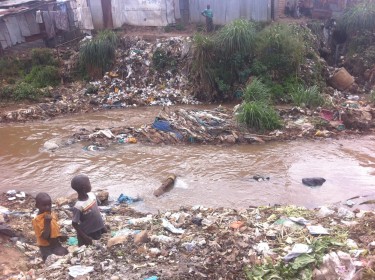
While government action on alleviating the problem remains stagnant, the help coming in to the slum has been from non-profit and non-governmental organizations and individuals.
One of them is the Community Cleaning Services (CCS), a Kenyan non-profit focused on improving urban sanitation. Last year a toilet was installed near the market community in Mathare. Residents pay 5 shillings ( US $.05 ) to use it, but unlike the hanging toilets, these have their own collection system, which does more than just gather waste. CSS, partnering with Sanergy and Takamoto biogas [5], has implemented a system in the slum that turns human waste into electricity to be used for heating and cooking via biogas, much to the excitement of Mathare's residents.
Currently there are two to three toilets in the slum with their own disposal system, but for the estimated 500,000 people that live in Mathare, it isn't nearly enough.
And while the cost is kept affordable, for some, it's still too much. When you have five children and you need to pay 5 shillings each time every child needs to use the toilet, it's a big price to pay, explained our Map Kibera guides. So people end up going back to old habits. Because, “At the end of the day, a human being must go to the toilet,” they said.
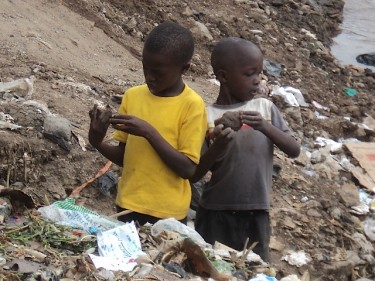
Mathare resident Ynyachulhuta, who gave us only her first name, pointed out that some of the hanging toilets in the slum were in dire need of cleaning and regularly overflowed, evidence that while the bio gas toilets were a start, more work needed to be done to meet the needs of the community and keep it healthy.
Other dwellers we spoke to said they were happy about the bio gas toilets, but they wanted more. Ynyachulhuta also suggested that visitors coming to the slum should donate money so another bio gas toilet can be built.
To add to the danger, houses built on unstable ground coupled with a river system filled to the brim with waste means that the river overflows and washes away people's homes. The floods have killed residents in the past as well. Flash floods just two months ago killed one person [6] while leaving several others missing.
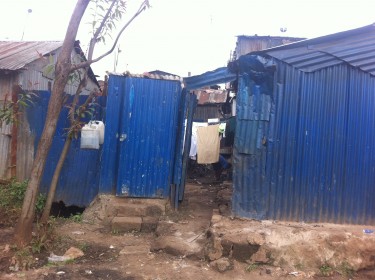
According to the United Nation's Human Right to Water and Sanitation universal access to sanitation is “not only fundamental for human dignity and privacy, but is one of the principal mechanisms for protecting the quality” of water resources.
The Kenyan Slum Upgrading Programme (KENSUP), a government initiative under the Ministry of Housing, has outlined the issue of water, sanitation and solid waste management into account in Mathare and other slums in Nairobi, but with the population of Kenya projected to double by 2025, “achieving sustainable and effective urban sanitation in Kenya” is a pressing need, says UK-registered charity, “Building Partnerships for Development of Water and Sanitation [7]” [ PDF]
